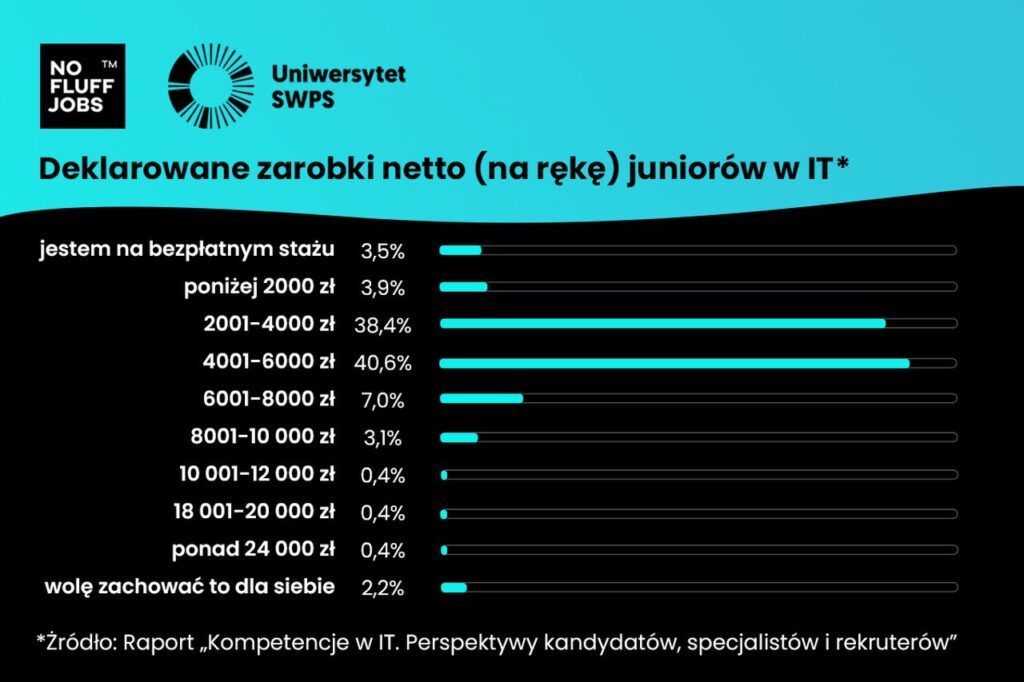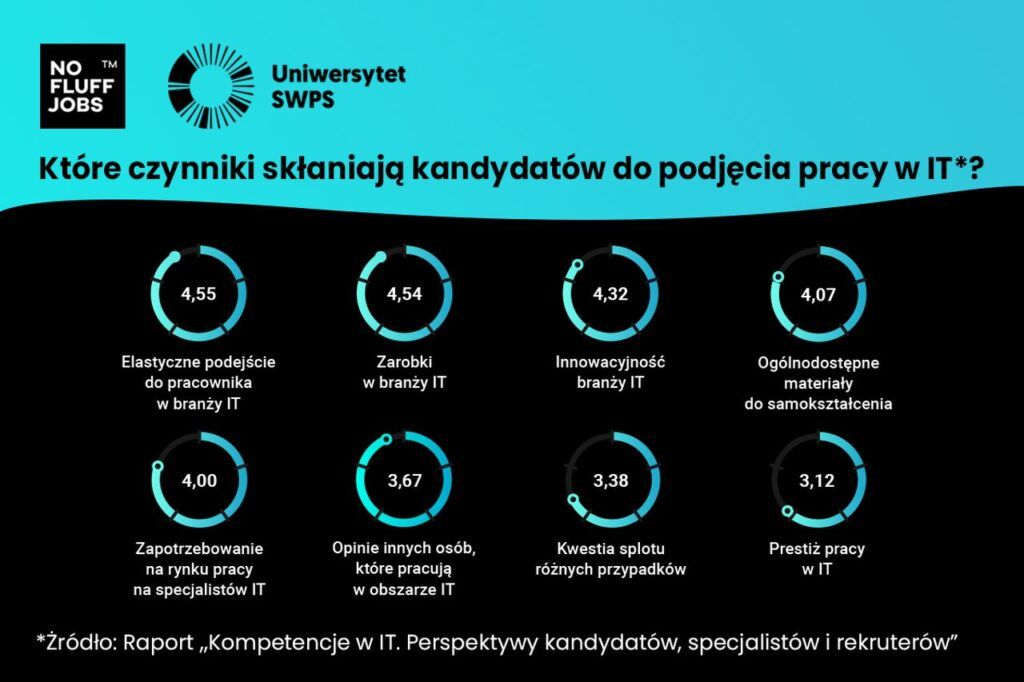Juniors and promotions – problem in IT?
According to the report “Competencies in IT. Perspectives of candidates, specialists and recruiters”, prepared by No Fluff Jobs and the University of SWPS, juniors and trainees, that is, beginners in IT, together account for 22% of the total number of IT employees. All employees in the industry in Poland, and their salaries are in the range of 2-6 thousand. PLN 2 thousand net. What’s more, more than half have between 2 and even 5 years of experience in the industry, with only 27.8 percent. of beginners received a promotion last year. Organizations in their survey decided to take a closer look at their situation as well, and present it from the perspective of both candidates, IT staff at all experience levels, and recruiters.
More than just money is important. Flexible approach to employee also attracts to IT
According to the study No Fluff Jobs and the University of SWPS, more than 40 percent of. IT beginners earn from 4.1 to 6 thousand PLN. PLN 4.1 to 6 thousand net, and slightly more than 38 percent of the. – from 2.1 to 4 thousand. PLN net. Few declared salaries below PLN 2 thousand. PLN net (3.9 percent).), unpaid internship (3.5 percent.) or incomes within the range of 8.1-10 thousand. The net salary of IT specialists (3.1 percent of the.).
And although, according to candidates for a job in IT, the prospect of good earnings in the future is important, when asked to rate the most important issues for them to enter the industry on a scale of 1 to 5, the most points were awarded to the flexible approach to IT employee (4.55). Earnings ranked second (4.54), followed by industry innovation (4.32).
The report also examined the level of experience of employees in the IT industry. It turned out that juniors and trainees account for 22.5% of the workforce. of all employees in this sector in Poland. In comparison, seniors and experts – 21.2 percent., and the most numerous group, IT specialists with intermediate experience – 30.7 percent. 15 percent. are, in turn, leaders and managers, and high-level employees (directors, CEOs) – 2.6 percent. Interestingly, just over 6.3 percent. IT specialists admitted that in the company in which they work, the job title does not specify the length of service. Nearly 2 percent. indicated that they hold a different position than all those specified in the survey.

– Juniors and trainees are a large group of employees in IT. According to the report, there are almost as many of them as seniors. This means that companies should not ignore such a large group, which are people starting work in the industry and it is worth investing in new talent – says Paulina Król, Head of People & Operations in No Fluff Jobs. – Especially when we face such a high demand for IT services, while the shortage of specialists on the market. According to estimates, Europe is already lacking as much as 600 thousand., and the demand in the coming years will be even greater. We wanted the “Competencies in IT” report to help us understand the needs and expectations of both candidates, IT workers, and employers represented by recruiters. We believe that the results of our report will be helpful and bring tangible benefits to each of these groups.
Promotions a pain for juniors
In their survey, organisations also decided to look at the issue of promotion in the most junior groups. And their path to obtaining a higher position can be long. More than half of the beginners in IT admitted that they already have 2 to 5 years of experience in the industry, with only 27.8 percent last year. juniors.
– In the IT industry the jump from junior to senior often requires more time and skills than a promotion from junior to senior. How can we help budding professionals spread their wings?? It is worth, for example. Introduce mentoring programs in organizations and make sure that each junior has his or her own so-called “mentor”. ) Candidates when asked about the most important soft skills in IT, said Paulina Król, Head of People at No Fluff Jobs SQL “buddy”, that is, a person with seniority and experience, which will help them to implement more efficiently in the project and provide substantive consultation in case of doubt – says Paulina King, Head of People in No Fluff Jobs. – Investing in juniors will bring benefits in the future, because companies will gain dedicated and engaged mid- and later – seniors, which are so lacking in the IT labor market. In turn, IT specialists at the beginning of their careers should be proactive and absorb knowledge from more experienced. At this stage of their career, soft skills are particularly important: the ability to work in a group, accepting feedback and communication skills.

IT candidates. They focus on self-study, but the choice of specialization and technology is not always consistent with the needs of the market
The survey showed that IT candidates are determined to start a career in the industry. The most useful in taking up a job, on a scale of 1-5, in this sector, were self-study (4.67). Specialist courses came second (4.0), while programming school came third (3.44). Outside the podium, in turn, formal education (3.07).
And what technologies do they consider necessary to start a career in IT? Nearly 30 percent of the candidates are interested in learning. could not specify where they should start their IT adventure. Almost half of the candidates indicated Python, 44 percent. Java was ranked only fourth (27 percent of. SQL. Outside the podium was JavaScript (31 percent.) and C++ (28%).). However, their more senior colleagues working in the profession would have made a different choice. In the first place they indicated SQL (46% ).), followed by JavaScript (37%).) and Python (31%).). Java was only ranked fourth (27 percent.), and on the fifth place – C# (21%).). So often mentioned by the candidates C++ was indicated by only 9 percent of the candidates. specialists.
Soft skills in IT according to the candidates and the expectations of recruiters
Candidates asked about what they think are the most necessary soft skills in IT, problem solving was indicated first (79.9%).), as the second and third respectively creativity/innovative thinking (79.2 percent.) and flexibility, ability to work in a dynamically changing environment (77.7%).). Slightly fewer percentage points were scored for communication skills and teamwork (75.5% and 71.7% respectively.). In last place was the handling of criticism (66.5%).).
At the same time the survey asked recruiters what soft skills they consider necessary in employees in this industry. And here the answers were quite different than in the case of the candidates. It turned out that in the first place the ability to work in a team is desired (90.5%).) and communicativeness (85.4 percent.). The first “three” was closed by dealing with criticism (67.7% ).). Other, so highly scored by the candidates features turned out to be less important to recruiters. The ability to work in a dynamically changing environment received 58.8 percent of. indications, problem solving and creativity respectively 49.5 and 40 percent.

– University is the link between the student and the job market. At SWPS University we focus on ensuring that our degree programs are best suited to the demands of the labor market, and that our graduates are prepared to begin their professional careers – says Łukasz Skorupski, Creative Director at SWPS University. – To be able to do that, we know that we have to know the market very well, react to all the changes and sometimes even anticipate them. Prepared report gave us the opportunity to diagnose the needs of employers and employees in the IT industry at different levels. It also provided a look at the dynamics of the IT job market and what soft and technical competencies are important in career development.
The topic of expectations of IT professionals and recruiters will also be discussed during a free webinar, which will take place on 16 February at 17.00. Will be conducted by Jakub Grzesiuk, an IT recruiter at Huuuge Games and a graduate of SWPS University, who will talk with Paulina Król – Head of People at No Fluff Jobs. In order to take part in it, all you have to do is register in advance on event website.


